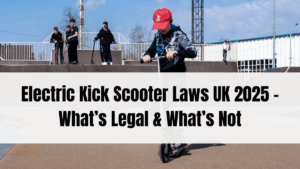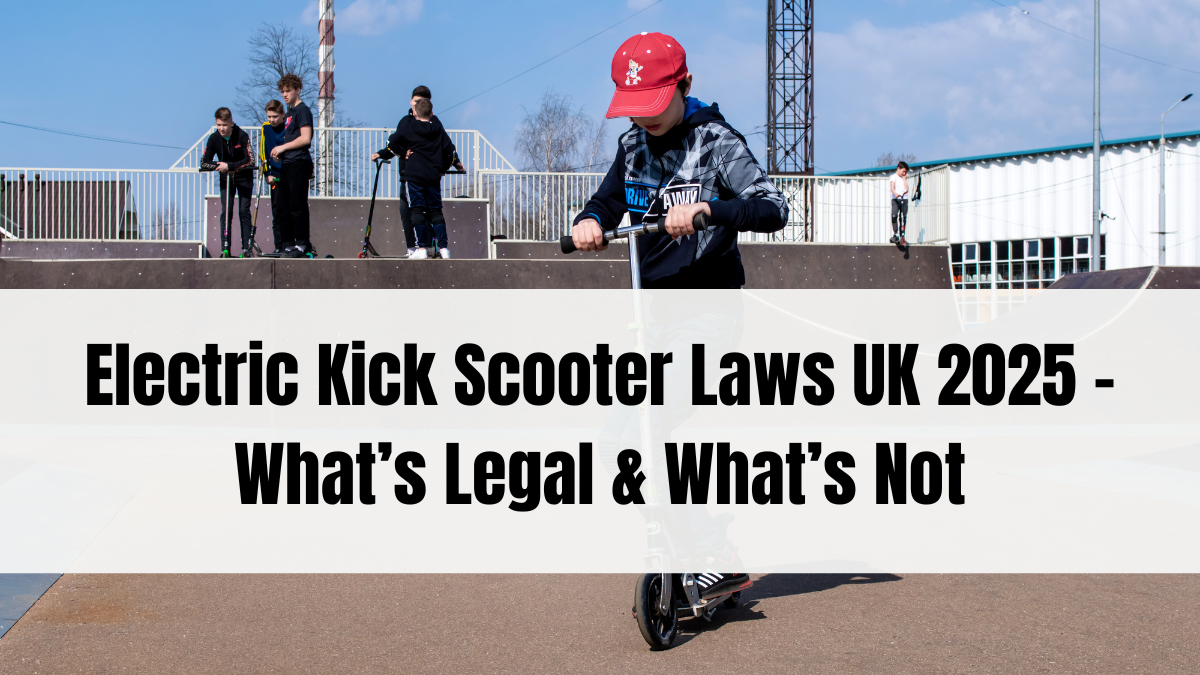In 2025, the UK government has clarified and revised regulations surrounding the use of electric kick scooters (EKs), addressing a growing demand for eco-friendly, last-mile urban transport. The updated Electric Kick Scooter Laws UK 2025 define where and how e-scooters can be legally used, what is required for road usage, and the penalties for violating rules.
This guide provides a complete overview of current electric scooter laws, rental schemes, ownership restrictions, and what UK riders must know before hitting the road.

Why Electric Kick Scooter Laws Have Changed in 2025
The popularity of electric kick scooters has surged in cities like London, Manchester, Birmingham, and Bristol. But the lack of consistent regulation led to misuse, pedestrian complaints, and safety concerns. As of 2025, the government aims to:
-
Promote micromobility as a sustainable transport mode
-
Ensure safety for riders and pedestrians
-
Regulate private ownership and usage
-
Integrate scooters with public transport infrastructure
The Electric Kick Scooter Laws UK 2025 are now part of the Department for Transport’s (DfT) Micromobility Framework.
Key Rules for Electric Kick Scooter Use in 2025
The UK distinguishes between rental e-scooters and privately-owned e-scooters. Here’s what’s allowed and what’s not:
Rental E-Scooters (in trial zones and approved cities):
-
Legal for use on roads and cycle lanes
-
Must be rented from authorized operators (e.g., Lime, Dott, Voi)
-
Max speed: 15.5 mph (25 km/h)
-
Riders must be 16+ and hold a provisional or full driving licence
-
Helmet use recommended but not mandatory
-
Insurance provided by rental operator
Privately-Owned E-Scooters:
-
Still illegal to use on public roads, pavements, or cycle lanes
-
Can only be used on private land with owner’s permission
-
No registration, tax, or insurance framework yet in place
-
Enforcement includes fines, penalty points, and confiscation
Riders found using private scooters illegally on public roads face £300 fines and 6 penalty points, with police cracking down across major UK cities.
Legal Use Zones & Trial Extensions
The DfT has extended e-scooter rental trials until May 2026, with more cities joining pilot programs in 2025:
-
London (all boroughs except Westminster)
-
Bristol, Bath, and South Gloucestershire
-
Milton Keynes, Nottingham, and Birmingham
-
New additions: Leeds, Sheffield, Liverpool, and Reading
Only government-approved rental schemes are legal on public infrastructure. GPS-limited speed zones, no-ride zones, and parking areas are enforced via apps.
Safety Requirements for Electric Scooter Riders
Under the Electric Kick Scooter Laws UK 2025, safety remains a top priority. Rules include:
-
Riders must not ride under the influence of alcohol or drugs
-
One person per scooter (no passengers allowed)
-
No use of phones or headphones while riding
-
Lights and reflectors must be active during low visibility
-
Riders must follow regular road rules like stop signs and signals
Police are actively monitoring high-risk zones and parks, issuing fines for reckless behavior or illegal modifications (e.g., increased speed).
Government’s Plan to Regulate Private E-Scooters
While private e-scooters are still banned from public roads in 2025, the UK government is developing a regulatory framework that may:
-
Introduce mandatory insurance and registration
-
Enforce safety checks and age restrictions
-
Create a licence class for low-speed electric vehicles
-
Set design and speed standards for manufacturers
A public consultation was launched in early 2025, and legislation is expected to be drafted by the end of the year. Until then, private users must ride only on private land.
FAQs
Are privately-owned e-scooters legal on UK roads?
No. As of 2025, privately-owned electric scooters are still illegal to ride on public roads, pavements, or cycle lanes. Only rental scooters in authorized zones are allowed.
Can I rent an e-scooter in London?
Yes. London supports rental schemes through operators like Lime, Dott, and Tier. You must be over 16 and have at least a provisional driving licence.
What is the speed limit for electric scooters in the UK?
Rental e-scooters are capped at 15.5 mph (25 km/h). Some trial zones enforce lower speeds in specific areas through GPS-based geofencing.
Will private e-scooters become legal in the future?
Possibly. The government is currently reviewing regulations and considering a framework for legalizing and regulating private e-scooters by 2026.
What happens if I’m caught using a private e-scooter on the road?
You may be fined up to £300, receive 6 penalty points on your driving licence, and have your scooter confiscated by police.
Click here to know more.
